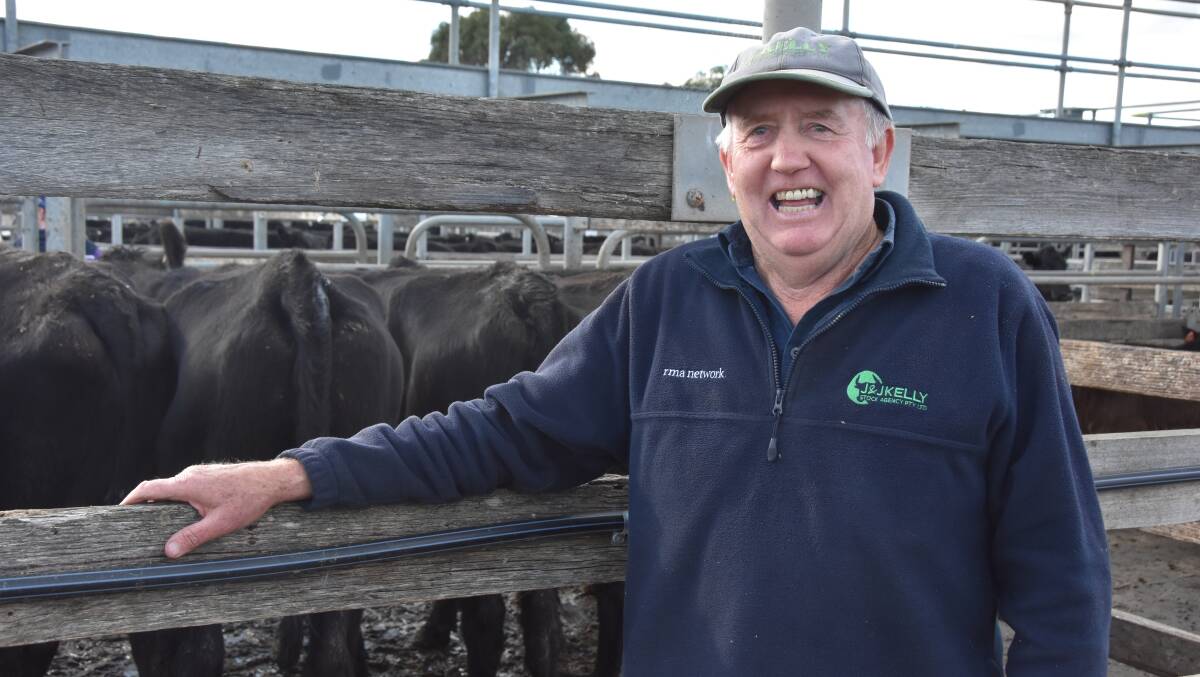
Victorian stock agents say while foot and mouth disease is weighing on producers' minds, it's not the biggest reason for a price correction in sheep and store cattle markets.
Subscribe now for unlimited access.
$0/
(min cost $0)
or signup to continue reading
They say wintry conditions have seen both yardings and prices slump in recent weeks.
Colac and Euroa agents have cancelled monthly store sales, while numbers of cattle yarded, or planned to be drafted, have dipped sharply at Pakenham and Yea.
"People are just hanging off, they can smell spring is not too far away," Nutrien Ag Solutions Colac auctioneer Phil Douglas said.
"When FMD first came out there were a few people panicking, people dropped the bottom lip and thought it was all over."
He said it was very cold and wet in the south-west.
"The store job is still very good, it's just not the highs it was six months ago," he said.
Northern buyers had not come back to the sales as they were also "looking for a bit of [pasture] growth.
"I think its a 'wait and see' approach - the plainer cattle have taken a little bit of a hit and people with hay stocks have decided to hold on," he said.
Read more:
At Kyneton, agents also said poor weather had resulted in only 260 head being yarded.
Warrnambool store cattle sale saw about 600 head yarded, revised downwards from the advertised 800.
Warrnambool stock agent and auctioneer Jack Kelly, JJ Kelly, said prices had dropped prior to last week's store market.
"That's possibly the reason they [farmers] have hung onto cattle," Mr Kelly said.
"You really can't say it's due to FMD because normally that would push them [cattle] in, wouldn't it?"
Elders Euroa livestock manager Joe Allen said the town's three agents managed to muster only 200 cattle between them.
"We generally get moderate numbers, this time of year," Mr Allen said.
"Prior to the FMD scare the price correction has probably just steadied the ship and people have been obliged to hang onto cattle and get a bit of sunlight onto them."
He said agents decided to postpone the sale before viral FMD fragments were found in wastewater in Melbourne.
"In the prime cattle and sheep markets we are seeing a tip-out of stock, but we are not seeing it in the store market," he said.
Nutrien Harcourts Euroa auctioneer Russell Mawson said he was advising clients "to bat on.
"It's a bit like COVID - we got into a bit of scaremongering, and it cost our country hundreds of billions of dollars, but we are still alive," Mr Mawson said.
An FMD outbreak in Australia would have a massive impact, he said.
"Having said that, it's probably a good month to stand down, just because it has brought the whole job back a long way," he said.
"Just remember a farmer can handle a fire, a flood or a drought, but can't stand a paddock of feed.
"The attitude is the job's too soft, just hold off, why bother?"
Nutrien Ag Solutions Leongatha livestock agent Eddie Hams, Leongatha, said many cattle had already been sold.
"There wouldn't have been much over 1000 head at Pakenham, I haven't got hardly any for Koonwarra," Mr Hams said.
"I don't think foot and mouth makes any difference, whatsoever, people are just continuing on," Mr Hams said.
Nutrien Harcourts Bendigo stock agent Nick Byrne said the lamb market was "tough" at the moment, but FMD did not have a big effect.
"There is no doubt we have had sheep, in the last couple of weeks, that, had FMD not been an issue, they would not have been in the yards," Mr Byrne said.
"But it's the exception, not the rule."
There had been a "very severe" correction in prices he said.
"The very best presented lambs are still tracking at the high $6 a kilogram but there are a portion of lambs that are long in the skin and just not presented quite right and they are back around $5/kg mark," Mr Byrne said.
"We were talking $8/kg not that long ago."
He said while there was "a lot of concern" about FMD, some of the scaremongering around it had not been helpful.
The slump in prices was due to other factors, including staff shortages on abattoir kill floors and boning rooms.
"Processors have shipping issues, they are definitely getting price pressure from overseas markets because inflationary pressures aren't isolated to Australia," Mr Byrne said.
"There are a lot of lambs being hung onto through the autumn, which perhaps would not have been there previously."


